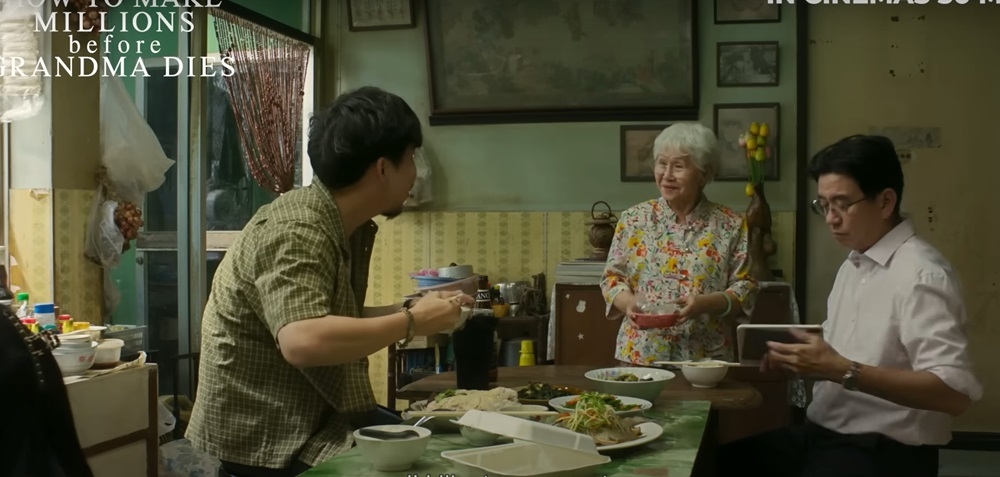JUNE 15 ― If you’ve been paying even a little bit of attention on social media, surely you would’ve noticed the buzz surrounding the release of Thai film How To Make Millions Before Grandma Dies.
Opening in Malaysia around two weeks ago, it has now collected RM10 million in just 12 days, and judging from the way the buzz is still going and the very healthy number of showtimes and cinemas still playing the movie all across Malaysia, it’s definitely going to make a few more millions in the next few weeks.

Already the biggest local film in Thailand when it opened during the Songkran holidays and grossed THB300 million (RM38.6 million) as of April 24, topping the Thai box-office charts for 21 consecutive days, ahead of Hollywood blockbusters like Godzilla X Kong: The New Empire and The First Omen, it was also a big hit in Indonesia when it surpassed two million admissions there at the end of May.
It has even conquered Singapore now, collecting S$1.7 million in just 11 days, with surely more to come and it definitely looks like things are moving the same way in the Philippines as there have been reports that the local distributor has had to double the number of cinemas showing it for its second week, which is something that very rarely happens, especially in this post-pandemic world where streaming is king and even superhero movies and big franchises have recorded underwhelming box-office numbers.
The heartwarming thing about the status of How To Make Millions Before Grandma Dies as a regional box-office hit is how unexpected it is.
As far as Asian hits go, it doesn’t fall into the usual genres that these films belong to, which are either horror, romance or comedy films.
It’s very much a tear-jerking family drama, but played in an understated manner which will remind you of Japanese films, which doesn’t exactly scream box-office hit however you want to look at it.
But thanks to some pretty great execution, savvy marketing and super strong brand recognition, courtesy of Thai studio GDH’s reputation as a hit-maker, we’ve got ourselves an underdog regional hit (albeit with good pedigree) that will be talked about for a long time.
Let’s go to the execution part; the movie focuses on M (played by Thai pop star Putthipong Assaranataku aka Billkin), a university dropout who’s trying to make a career out of being a game caster.
He lives with his mom Chew, and has a small family consisting of his grandmother Amah, loser gambler uncle Soei and successful uncle Kiang.
Never one who cares much about Asian family values and traditions, M finds a possible way out of his financial rut after witnessing his cousin Mui inherit her grandfather’s huge house after becoming his caregiver during his last days.
Inspired by this seemingly easy way to inherit money, assets, anything, M sets his sights on his Amah, especially after hearing that she has Stage 4 colon cancer.
But things are not as easy as he imagined as Amah is an independent old woman who lives alone and sells congee every morning, not to mention that Kiang seems to be Amah’s favourite child who’s probably going to inherit whatever money or assets that she will leave behind.
First time feature director Pat Boonnitipat (who most notably helmed the Bad Genius TV series previously) does a swell job balancing our sympathies as M tries to win over Amah’s heart because even though his initial motivations are clearly financial, one must never forget that love can also find a way through anyone’s heart, provided that one is brave and strong enough to want to open it up in the first place.
Filial piety is a concept that might be alien to people from the West, especially those from the younger generation, but over here in Asia, it has always been a big part of our lives.
Movies about filial piety have also been made plenty of times before, whether it’s classics like Tokyo Story, Late Spring and Make Way For Tomorrow or the countless melodramatic TV series and telemovies that are still being made and shown on TV to this very day.
How To Make Millions Before Grandma Dies feels fresh because it comes in that GDH aesthetic package that people all across Asia have come to associate with classy and good mainstream filmmaking that’s approachable, but unique enough to have its own flavour.
That’s the brand recognition that I was talking about. For fans of Asian cinema, GDH is like a guarantee of quality mainstream films, the way that A24 or Neon is a guarantee of good, edgy cinema in the US.
And when you couple that strong brand recognition with savvy social media-friendly marketing like posting before and after videos of seeing the film in the cinema, with even the English title for the movie open to be played with in your reels or TikToks, it’s a great recipe for word-of-mouth success.
And thanks to the borderless reach of social media, that word-of-mouth can spread like wildfire throughout the region, which is what we’re witnessing with the regional success of this movie.
GDH may have started by peddling rom-coms and horror flicks, but with the huge success of Grandma, they may be emboldened to spread their wings even more, and I’m all for that.
* This is the personal opinion of the columnist.






















